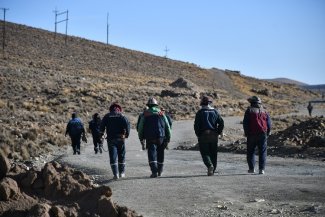Neoliberalism is resurfacing in Paraguay as a result of the current measures introduced by the government of Horacio Cartes Jara.
These measures were denounced recently by Fernando Lugo Méndez, the former President of Paraguay.
In an interview given to Prensa Latina, the now Paraguayan senator said that neoliberalism – which had been abandoned with the rejection of the North American proposal of the Free Trade Area of the Americas (FTAA) – is now beginning to resurface with these new proposals.
According to Lugo, the current government is trying in the short term, to reduce the State to a minimum, with the elimination of some institutions resulting in the loss of thousands of jobs.
This is the case for example, with the draft law on the Regulatory Framework for the electricity sector which aims to end the National Electricity Administration’s (ANDE) monopoly on electric power distribution.
The former President said that President Jara, who took office on 15 August, 2013, will face major challenges to achieve consensus, hold negotiations and discussions because of the climate of continuous protests in the country.
Today, the governability of the country will also require agreement from the different social and political fronts in Paraguay.
As leader of the Frente Guasú, a coalition of parties and social organisations, Lugo also took part in the joint Trade Union, Campesino and Social Congress held recently in Asunción, which highlighted that trade unionism in Paraguay has a large responsibility and obligation to protect the interests of the large social groups that have been consistently marginalised by successive governments.
During the Congress, several trade union leaders questioned President Cartes’ neoliberal model and warned him that “they have already overthrown one government” an allusion to the government of Raúl Cubas Grau that was forced to step down in 1999.
Asunción was the location for a large protest demonstration organised by the main Trade Union Centres and the Coordinadora Central de Organizaciones Campesinas e Indígenas del Paraguay.
It is estimated that over 14,000 people took part in this march supported by the Joint Congress.
They came from all over the country and also included international trade union leaders who wanted to show their solidarity with their Paraguayan comrades.
Within this context, other cities celebrated the International Day of Solidarity with Paraguay organised by the Trade Union Confederation of the Americas.
In São Paulo, Brazil, an international trade union delegation protested outside the Paraguayan consulate.
The demands made during the demonstration include the fight against poverty, decent work, agrarian reform, the introduction of wage setting policies, a guarantee of trade union freedom and collective bargaining and opposition to the privatisation of state companies, a taxation policy that makes large landowners liable for tax and the recovery of illegally acquired land.
Paraguay has a population of 6.687 million but 42 per cent of the wealth is controlled by the richest 10 per cent whilst the bottom 40 per cent don’t even receive a 10 per cent stake.
The 10 per cent poorest families have an average monthly income of only 45 US dollars.
They also called for the end to mass dismissals, for example in public institutions such as in the Ministries for Health, Education and Public Works and in the Empresa de Servicios Sanitarios (water and sanitation company).
The demands also included the recovery of riches from multinationals, the industrialisation of agricultural production and the non-criminalisation of social struggles.
Following the demonstration, the main trade union and social leaders were received by President Cartes who was accompanied by the Presidents of the Legislature and the Judiciary. The President committed to addressing each one of the different parties’ demands.
Luis Aguayo, General Secretary of the Mesa Coordinadora Nacional de Organizaciones Campesinas denounced the speeding up of the process for GMO liberalisation for the benefit of the agro-exporting sectors.
This is a sector which historically has caused serious environmental and health problems on account of deforestation and the high levels of pollution that it causes.
Aguayo also pointed out that there are huge disparities in land ownership. 2 per cent of the population own 80 per cent of the land and calls on the new Paraguayan government to rectify this situation.
Equal Times produced a special report to the indigenous people of Paraguay and to the exploitation of the country’s national resources. To read it click here.








